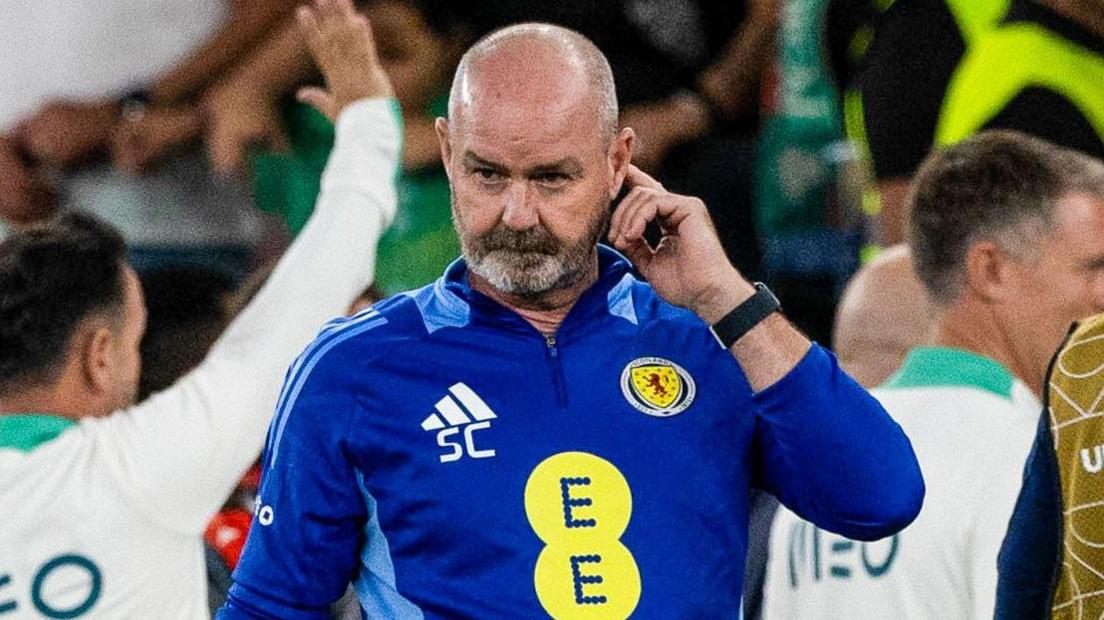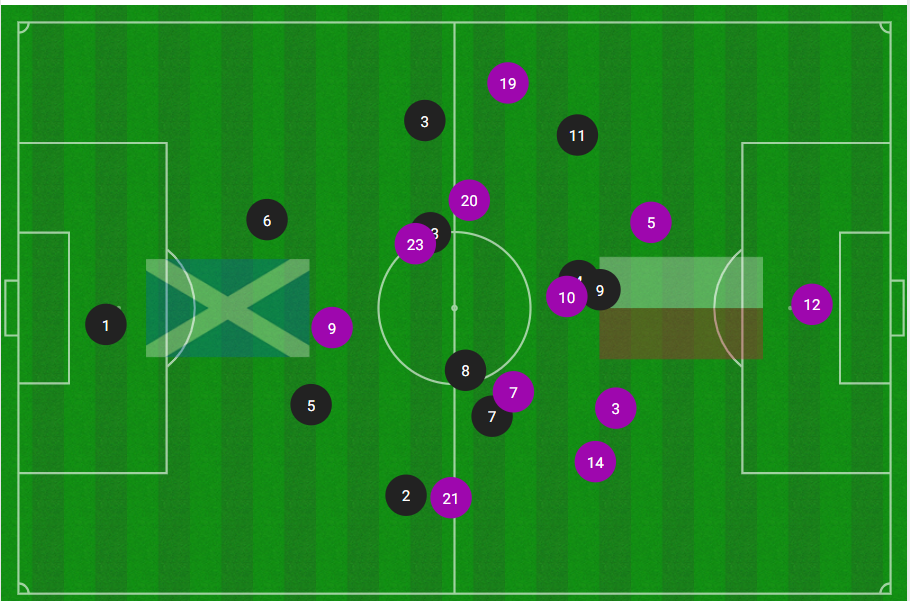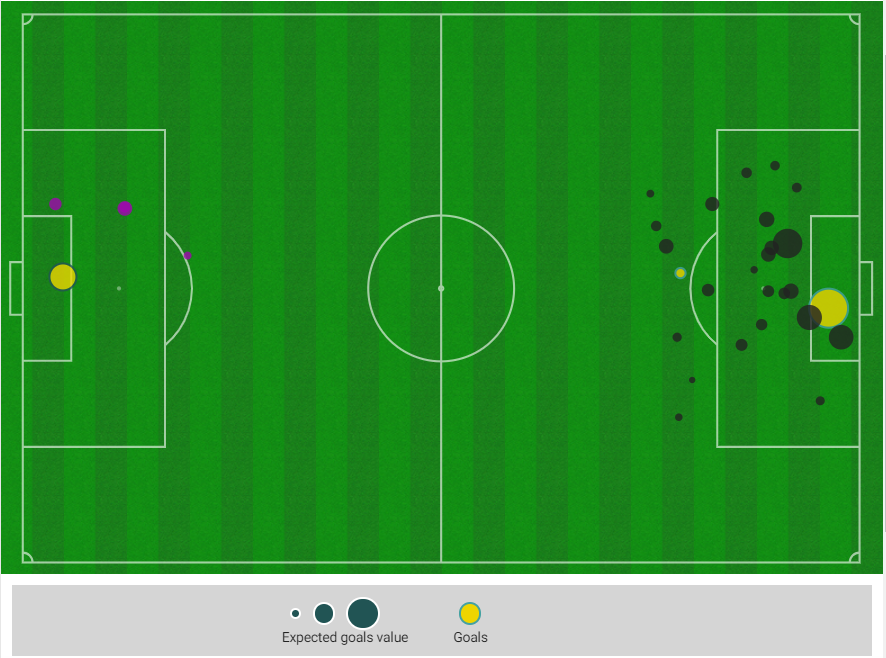The key issues for struggling & depleted Scotland

Steve Clarke's side have won just one of their last 14 matches and are without more than 10 players for their Nations League double header this week
- Published
Nations League: Croatia v Scotland
Venue: Stadion Maksimir, Zagreb Date: Saturday, 12 October Kick-off: 17:00 BST
Coverage: Listen live on BBC Sounds and BBC Radio Scotland and follow live updates on the BBC Sport website & app.
Scotland assistant head coach John Carver said this week the national side "might have to suffer" in the short term amid tough games and a long injury list.
But, with just one victory against Gibraltar in their last 14 internationals, the Tartan Army might not be in the mood to endure much more.
Since sailing through qualifying for Euro 2024, Scotland have toiled. Goals have been hard to come by in attack while they have been flying in at the other end, often late in games.
With more than 10 players absent through injury just as Steve Clarke's side mix with the big boys in Nations League A, expectations may have to be lowered.
But, results aside, what signs against Croatia and Portugal would help supporters keep the faith before World Cup qualifying next year, even if Scotland fail to halt their poor run?
Scotland 'desperate' to end poor run - McLean
- Published10 October 2024
You are Scotland boss Clarke… what would you do?
- Published11 October 2024
Scotland Nations League matches only available on YouTube
- Attribution
- Published10 October 2024
Can fresher faces bring positivity?
Some of the newer faces in the squad stepping up and making an impact could inject some life into Scotland's form this year.
Clarke has made the decision not to call up many players from the under-21s squad given the junior side are going well in their own European qualification campaign and have crucial games against Belgium and Kazakhstan to play during this international window.
It means in-form Scottish Premiership midfielders Lennon Miller and Connor Barron, or Sturm Graz right-back Max Johnston, are missing, which could have generated some excitement.
Even with lots of players out, the squad has a familiar feel to it and it falls to teenage Middlesbrough winger Ben Doak and Vancouver Whitecaps midfielder Ryan Gauld, who both made their debuts as substitutes last month, to bring some freshness.
Doak has made five appearances in the Championship since the last international break, when the 18-year-old helped set up a goal against Poland and scored his first goal on loan to Boro from Liverpool against Stoke City.
His pace and dribbling ability offers something completely different, particularly with the recent switch to a back four.
Gauld has been nursing an injury in recent weeks, but the 28-year-old looked bright when coming on against Poland, creating two chances.
Then there is Andy Irving, the West Ham United midfielder taking part in his first camp. His story in itself is positive, having left Heart of Midlothian before ending up in the Premier League via the lower leagues in Austria and Germany.
"It's been a mad journey to be honest," the 24-year-old told the Scotland national side's media channels this week.
"In Austria, I played more as an attacking midfielder and number 10 - when I was in Scotland, I was a bit more defensive. I've added different things to my game."
Can new style take root?
Clarke switched up his long-standing 3-4-2-1 formation for a 4-2-3-1 against Poland and Portugal amid injuries and a need, he said, to "be more creative".
Scotland have scored just 16 goals in their last 14 games and those goals came from an expected goals (xG) rating of just 13.
That suggests Scotland create few quality chances, as does the fact they have averaged fewer than three shots on target over the last 14 matches.
Although the change of shape appeared to free up Scotland last month and they scored three times in two games, the volume of opportunities they created did not drastically improve from the previous 12 matches.
So the key question is whether Clarke can improve Scotland's attack in the absence of key players - and against elite opposition.
Luckily, Scott McTominay's fine goalscoring form has continued since his move to Napoli, but despite scoring 10 times in his last 17 caps, the former Manchester United midfielder needs help carrying the burden.
Glimpses of more exciting attacking play would certainly help re-ignite some positivity, but with issues in defence too, Clarke will be conscious of not opening up too much.

Scotland switched to a back four last month, but the average position graphic from the game against Poland shows they lacked width in attack at Hampden, with John McGinn (number seven) and Ryan Christie (number 11) playing as the widest midfielders.
Can Scotland re-discover art of defending?
Down the other end, things have also been tough for Scotland on this poor run. The days when they were miserly at the back have disappeared.
They have conceded 33 goals in 14 games, a rate of more than two per match - and, in their last game, Portugal had 17 shots in the first half alone.
Roberto Martinez's side needed a late winner from Cristiano Ronaldo to complete a comeback victory in Lisbon, but they should not have had to wait that long given the volume of opportunities they created.
Slightly worryingly, Scotland's xG against in their last 14 outings stands at 24, nine fewer than the actual number of goals they have let in.
That suggests opponents have been clinical, which is a factor given Germany, Netherlands, England, France, England, and Norway have all scored at least three times against Scotland in their recent difficult spell and have brilliant attacking players.

Portugal created a lot of good chances (black circles) against Scotland despite only scoring twice
However, conceding more goals than expected based on the quality of the opposition's chances could also hint at an issue with goalkeeping.
Norwich City's Angus Gunn has been criticised in recent months for his displays and is injured for the matches against Croatia and Portugal.
It means a recall for Hearts' Craig Gordon - at 41, not the long-term solution but likely to be the shor-term option in the absence of other goalkeepers playing regularly at their clubs.
Regardless of who plays in goal, Clarke has his work cut out to re-shape Scotland into a cohesive defensive unit with so many key personnel missing - and while trying to expand their attacking game.
Scotland have also conceded after the 85th minute in five of their last six matches, something Clarke said could be helped by him giving more instruction from the bench and using substitutes more wisely, but that also depends on the resolve of the players.
There are so many things for the Scotland head coach to grapple with - and his ability to do so in the final four Nations League games will set the narrative before World Cup qualifying next year.